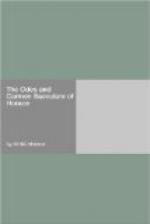Those piles, among the clouds at home.
I have understood molem generally of the buildings of Rome, not specially of Maecenas’ tower. The parallel passage in Virg. Aen. i. 421—
“Miratur
molem Aeneas, magalia quondam,
Miratur portas strepitumque
et strata viarum”—
is in favour of the former view.
What once the flying hour has brought.
I have followed Ritter doubtfully. Compare Virg. Georg. i. 461,—
“Quid vesper serus vehat.”
Shall waft my little boat ashore.
I have hardly brought out the sense of the Latin with sufficient clearness. Horace says that if adversity comes upon him he shall accept it, and be thankful for what is left him, like a trader in a tempest, who, instead of wasting time in useless prayers for the safety of his goods, takes at once to the boat and preserves his life.
BOOK IV, ODE 2.
And
spices straw
Before your train.
I had written “And gifts bestow at every fane;” but Ritter is doubtless right in explaining dabimus tura of the burning of incense in the streets during the procession. About the early part of the stanza I am less confident; but the explanation which makes Antonius take part in the procession as praetor, the reading adopted being Tuque dum procedis, is perhaps the least of evils.
BOOK IV, ODE 3.
On soft AEolian airs his fame shall nourish.
Horace evidently means that the scenery of Tibur contributes to the formation of lyric genius. It is Wordsworth’s doctrine in the germ; though, if the author had been asked what it involved, perhaps he would not have gone further than Ritter, who resolves it all into the conduciveness of a pleasant retreat to successful composition.
BOOK IV, ODE 4.
I have deranged the symmetry of the two opening similes, making the eagle the subject of the sentence in the first, the kid in the second, an awkwardness which the Latin is able to avoid by its power of distinguishing cases by inflexion. I trust, however, that it will not offend an English reader.
Whence
in every field
They learned.
Horace seems to allude jokingly to some unseasonable inquiry into the antiquity of the armour of these Alpine tribes, which had perhaps been started by some less skilful celebrator of the victory; at the same time that he gratifies his love of lyrical commonplace by a parenthetical digression in the style of Pindar.
And watchful potencies
unweave
For them
the tangled paths of war.
On the whole, Ritter seems right, after Acron, in understanding curae sagaces of the counsels of Augustus, whom Horace compliments similarly in the Fourteenth Ode of this Book, as the real author of his step-son’s victories. He is certainly right in giving the stanza to Horace, not to Hannibal. Even a courtly or patriotic Roman would have shrunk from the bad taste of making the great historical enemy of Italy conclude his lamentation over his own and his country’s deep sorrow by a flattering prophecy of the greatness of his antagonist’s family.




